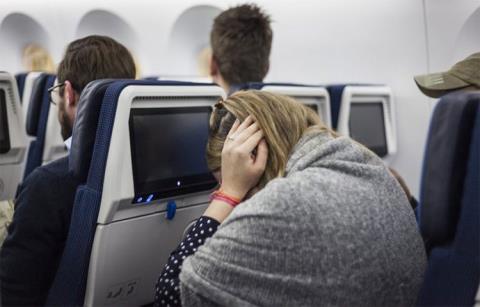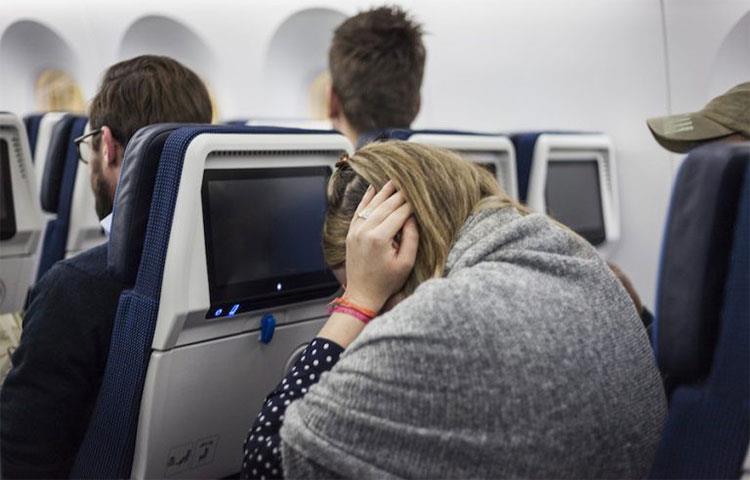Tinnitus on airplanes: Some things to know!

Nowadays, tinnitus appearing when flying is no longer strange to everyone. Anyone who has ever traveled on this vehicle has experienced it at least once. The discomfort usually won't last too long and isn't a cause for concern. However, there are still a few cases where a doctor's help is still needed.
So what is the cause of tinnitus? How to handle them? Let's find out through the article: "Tinnitus when flying: some things to know."
content
- 1. What is tinnitus when flying?
- 2. How to know?
- 3. Why do we have tinnitus?
- 4. Who is more likely to get tinnitus?
- 5. How not to have tinnitus?
- 6. When to see a doctor?
1. What is tinnitus when flying?
Tinnitus when flying is a symptom that causes a lot of discomfort for travelers. This condition occurs when there is an imbalance between the pressure in the middle ear and the pressure outside. They put a lot of pressure on the eardrum and don't work properly. The result is tinnitus.
2. How to know?
Tinnitus can occur on one or both sides with prominent symptoms such as:
- Moderate discomfort or pain in the ear.
- A feeling of fullness or stuffiness in the ear.
- Tinnitus, mild/moderate difficulty hearing.
This condition is usually not serious and responds well to some simple tips. However, in severe cases, they can manifest with:
- Feeling of intense pain.
- Moderate to severe hearing loss.
- Dizzy
- Ear bleeding
3. Why do we have tinnitus?
Our ears have a part called the eustachian tube, which connects the inside with the outside environment. They are responsible for regulating pressure, creating conditions for the eardrum to function normally.
When the plane takes off / lands, the air pressure changes so quickly that the eustache nozzle does not respond in time. As a result, the eardrum cannot function properly. As a result, the symptoms of tinnitus appear.

Why do we get tinnitus when flying?
In addition, some other cases can also lead to tinnitus such as:
- When diving deep underwater.
- When taking the elevator to a high-rise building.
- When driving up a mountain.
- When near an explosion.
4. Who is more likely to get tinnitus?
Any condition that blocks the eustachian tube or limits its function increases the likelihood of tinnitus.
Some common cases are:
- Children: due to the small size of the eustache spout.
- Having a cold .
- Suffering from diseases such as sinusitis, allergic rhinitis, otitis media.
- Sleeping during takeoff/landing: Because at this point we are not doing anything to equalize the pressure (yawn, swallow, ...)
5. How not to have tinnitus?
Here are some tips that might help you:
- Yawning and swallowing during takeoff and landing (eg chewing gum or sucking on candy): these activities help the eustachian tube work more efficiently. Thereby limiting the uncomfortable symptoms of tinnitus.
- Perform the Valsalva maneuver : close your mouth, close your nostrils with your hands, and slowly breathe out to your nose. We should repeat it a few times, especially during take-off and landing.
- Do not sleep during takeoff and landing. Then you can proactively implement the tips above when you start to feel symptoms.
- If possible, do not fly when your health is not good (eg, stuffy nose, cold, sinusitis, ..). If you've had recent ear surgery, check with your doctor before making a decision.
- Use over-the-counter nasal sprays: if you have a stuffy nose, you can use over-the-counter nasal sprays. The right time is 30 minutes to 1 hour before the plane takes off and lands. However, care should be taken to avoid overdose because they can also make stuffy nose worse.
- Try using earplugs: they will help equalize the pressure on the eardrum during takeoff and landing. However, it is also necessary to simultaneously perform yawning or swallowing movements to achieve greater efficiency.
6. When to see a doctor?
In most cases, tinnitus will improve with time. However, that's not always the case. Symptoms may persist or worsen, even with the above methods applied. When it does, you need treatment to help rebalance the pressure and relieve discomfort.
Tinnitus is a condition in which the eardrums are stressed, making them unable to function properly. Symptoms appear when there is a difference in pressure inside the ear and the outside environment. Specifically, the most common time for tinnitus to occur is during take-off and landing. However, some other cases can also cause this symptom such as driving to high mountains, taking the elevator ...
Tinnitus will usually improve over time. Some tips can be applied to relieve symptoms such as yawning or swallowing, chewing gum, etc. If tinnitus persists or gets worse, see your doctor for advice!